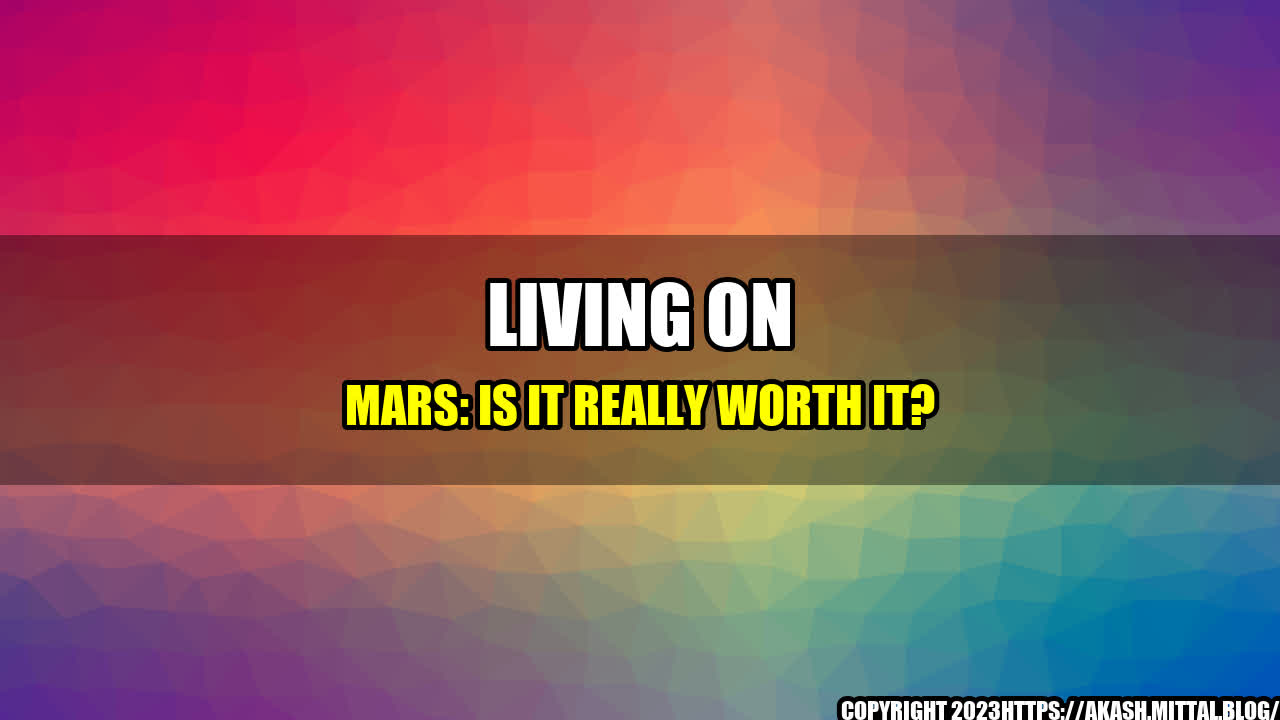
Once upon a time, a young boy named Jonathan dreamed of becoming an astronaut. Every night before he went to bed, he would stare at the stars and wonder what it would be like to explore the mysteries of the universe. He was fascinated by the idea of setting foot on another planet, perhaps even living there one day. But as he grew older and learned more about the challenges and dangers of space travel, his enthusiasm began to wane. Eventually, he came to the conclusion that the dream was too far-fetched and unrealistic.
Like Jonathan, many people today are captivated by the concept of living on Mars. The idea of colonizing the red planet has captured the public imagination ever since Elon Musk, the CEO and founder of SpaceX, announced his plan to establish a self-sustaining civilization on Mars within the next few decades. The idea is seductive in its simplicity: if we can't save Earth, we can always flee to another planet. But is it really that simple? In this article, I argue that living on Mars would be a terrible idea, and that our efforts should be focused on preserving and improving life on Earth instead.
Earth is Wonderful
The first reason why living on Mars would be a bad idea is that Earth is an amazing and unique planet that we should be grateful for. Our blue planet has an abundance of life and resources that we are still discovering and studying. Our oceans, forests, deserts, and mountains are home to countless species that are adapted to their specific environments. The complexity and diversity of life on Earth are staggering, and we have only scratched the surface of what we know about it. In contrast, Mars is a barren and lifeless planet that is covered in red dust and rocks. It has a thin atmosphere that cannot support human life, and it has no liquid water or organic matter. The idea of terraforming Mars, or making it more habitable for humans by introducing bacteria or other organisms, is highly speculative and has many risks and unknowns. We should cherish and protect our planet, not abandon it.
The second reason why living on Mars would be a bad idea is that it would be incredibly difficult and costly. The challenges of sending humans to Mars and keeping them alive there for decades or even centuries are enormous. The journey to Mars takes several months and is fraught with risks such as radiation exposure, equipment failure, and psychological stress. Once on Mars, humans would have to contend with a harsh and unforgiving environment that is unlike anything on Earth. They would have to wear space suits all the time, breathe recycled air, and eat processed food. They would also have to deal with the isolation, boredom, and loneliness of living in a small and enclosed habitat for years on end. The cost of such a mission would be astronomical, probably in the trillions of dollars. It would require the cooperation and funding of many countries and private companies, and it would divert resources and attention from more pressing issues such as climate change, poverty, and inequality.
The third reason why living on Mars would be a bad idea is that it would not solve the underlying problems that are threatening life on Earth. The idea of establishing a backup plan for humanity by colonizing Mars assumes that we can escape the consequences of our actions and decisions on Earth. But the truth is that everything we do on Earth affects the planet and its ecosystems in one way or another. Whether it is burning fossil fuels, cutting down forests, or dumping plastic in the ocean, we are changing the climate, degrading the soil, and polluting the air and water. These problems are not confined to Earth, but are part of a global system that affects the entire solar system. If we want to ensure the long-term survival of humanity, we need to address these problems directly and urgently, not look for an escape hatch.
Conclusion
In conclusion, living on Mars is a horrible idea that we should reject. It is based on a false and dangerous assumption that we can neglect or destroy Earth and still have a viable future. Instead, we should focus on preserving and improving life on Earth, by taking concrete actions such as reducing carbon emissions, protecting biodiversity, and promoting sustainable development. These actions may not be as glamorous or exciting as colonizing Mars, but they are essential for our survival and well-being on this unique and precious planet.
References:
- "NASA Mars Exploration Program" (https://mars.nasa.gov/)
- "SpaceX Mars Exploration Plan" (https://www.spacex.com/mars)
- "Why We Shouldn't Colonize Mars" by Vox (https://www.youtube.com/watch?v=uqKGREZs6-w)
- "The Case Against Mars" by Jacobin (https://jacobinmag.com/2021/04/colonizing-mars-elon-musk-space-exploration)
Hashtags:
#MarsMission #SpaceX #EarthIsWonderful #SaveThePlanet #ClimateChange #Sustainability
SEO Keywords:
Living on Mars, SpaceX, Earth, Terrestrial Life, Terraforming, Sustainability, Climate Change, Universe Exploration
Category:
Technology, Science, Environment
Curated by Team Akash.Mittal.Blog
Share on Twitter Share on LinkedIn